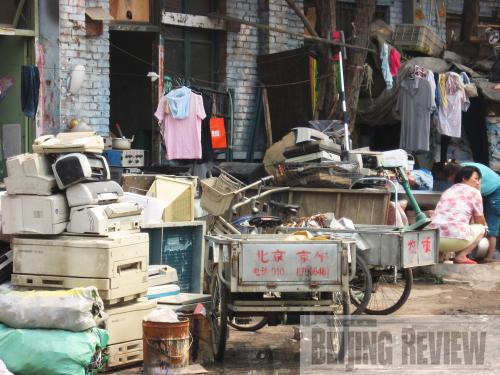|
 |
|
FROM EVERYWHERE TO HERE: Illegal e-waste workshops in Guiyu are said to have offices in large cities to collect electrical and electronic scraps. One such office is in Haidian District's Houbajia area in Beijing (DING WENLEI) |
Her memories are fresh and her worries are palpable. Images of innocent children being exposed to debilitating and deadly toxic chemicals in south China's electronic waste hub of Guiyu, Guangdong Province, haunt the mind of Jamie Choi, Greenpeace China's Toxics Campaign Manager.
"I will never forget their little dirty faces playing beside mountains of computer scraps and swimming in polluted, dark-colored river water," said Choi, who has made several trips to the town.
In the eight years after Guiyu became a collection point for electronic waste, Greenpeace China and other green organizations have not stopped urging major waste exporters to cease shipping their detritus to China. At the same time, they have been lobbying the Chinese Government to crack down more effectively on illegal electronic waste recycling.
China finally has its own regulation on waste electrical and electronic equipment (WEEE)—the Regulation on the Administration of the Recovery and Disposal of Waste Electrical and Electronic Products.
Announced on February 25, the regulation will hold producers liable for the costs of managing their products at the end of their lifecycles as of January 1, 2011. According to the regulation, China will license large qualified recycling plants and develop a recycling economy to better safeguard the environment and human health.
Yet, for environmental organizations, the Chinese Government and licensed recycling plants, it remains an uphill battle to smash the business chain of the illegal recycling of electronic waste, or e-waste, said Choi, who found that the situation in Guiyu had not changed during her September trip to the largest electronics waste site on Earth.
E-waste epidemic
When the Basel Action Network (BAN), a toxic waste watchdog, exposed Guiyu to a global audience in 2001, the area was already a dumping ground and recycling hub for e-waste.
Local farmers began making money from the computer scraps in the early 1990s when large amounts of electronic waste were shipped to south China's coastal cities, primarily from the United States and Japan. E-waste typically describes old, end-of-life or discarded electric appliances including computers, printers, photocopy machines, television sets and mobile phones.
| 